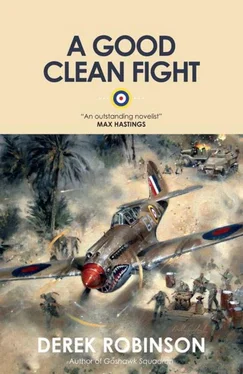“I wish we were,” Gibbon said.
“I don’t,” Lampard said. “If you want to slug it out, go and join the Tank Corps. Ah, bacon!” He rubbed his hands and leaned over the fire to sniff the aroma.
“He always says that,” Gibbon said to Dunn. “Every morning he says Ah, bacon! What does he expect? Jam sandwiches?”
“I think he likes bacon,” Dunn said.
“If there’s one thing I like,” Lampard said to Sergeant Davis, “it’s bacon.”
“One day we’ll have scrambled eggs,” Gibbon said, “and he’ll still say Ah, bacon! You mark my words.”
“Got any eggs?” Dunn asked the cook.
“Only dried.” The cook was busy forking bacon into mess tins.
“Don’t like scrambled eggs,” Lampard said. “They remind me of my prep school. The headmaster’s brother kept a chicken farm. We used to say that if you eat eggs all the time, you feel down in the mouth.”
A fitter called Blake said: “I wouldn’t send any kids of mine away to boarding school.” He spat out a bit of rind. “Not natural.”
They were standing in a circle around the fire. The air was as warm as a sunny English summer afternoon, but the night was still black.
“Oh, I don’t know,” Dunn said. “After ten years at boarding school, the rest of life comes as rather a pleasant surprise.”
“Who’s to say what’s natural?” Davis asked.
“Joe Harris wasn’t natural,” Corporal Pocock said, and took a quick swig of tea as if to wash away the taste of the words.
Tony Waterman, the signals officer, happened to be standing next to Pocock. “Mustn’t speak ill of the dead, old chap,” he said.
“Yes, sir?” Sergeant Davis stopped eating a biscuit and gazed at Waterman. “Why is that, sir?” Waterman was startled. He picked his teeth with his tongue while he tried to think of an answer, and failed.
“Eat too many eggs ,” Lampard said, talking to the fire, “and you feel down in the mouth .”
“We got it the first time, Jack,” Dunn said.
“Ask me,” Pocock said, “the only safe time to speak ill of Harris is now he is dead.”
“I thought you were his friend, corporal,” Lampard said.
“Harris had no friends. He didn’t get on with people, except when it came to killing them. He was bloody good at that.”
“Good, but not perfect,” Gibbon said.
“Killing the enemy is an admirable pastime,” Lampard said. “I myself quite enjoy it.”
“How many d’you reckon you killed at Barce?” Waterman asked.
“Hard to say. I expect quite a few went up with the ammo dump. Couple of dozen?”
Waterman nodded. He was Signals, he knew nothing about combat. “Seems reasonable. More than enough to avenge Harris, anyway.”
Gibbon said, looking at the sky: “Can you avenge someone before he gets the chop?”
Most of them let the question pass. It was too complex and uncomfortable; and anyway, who cared? But the idea interested Gibbon. “Premature retaliation,” he said, still studying the sky. “Vengeance in advance. By gum, there’s a lot to be said for it, Tony. It solves so many problems! Strike first and beat the rush! Draw blood now and avoid disappointment later! Revenge is sweet, so why wait until you need some? Shop early while stocks are plentiful.”
“You do blather on,” Waterman said.
“I might recommend Harris for a decoration,” Lampard said.
“His feet smelt worse than any man I know,” Davis said.
“Perhaps a Mentioned in Dispatches would do,” Lampard said.
There was a soft gray tinge in the sky. Soon the sand would be touched by shades of delicate pink and green and purple and, for a few minutes, the desert would look beautiful, before everything got roasted white again. The patrol busied itself, topping up fuel tanks and emptying bladders. They wanted to reach the Tariq el ’Abd while the thermos bombs would still be casting long shadows. If they were exposed, that is.
* * *
It had not been easy to get the Storch: the plane was overdue for overhaul, the fitters actually had it in the hangar, with the engine cowlings off and the tanks drained, when Hoffmann told them to put it all together and fill it up.
As the plane was being pushed out of the hangar, Major Jakowski’s car arrived, brakes screeching, horn blaring. Jakowski was in charge of airfield protection at Barce and he had just returned from a large meeting in Benghazi where he had been made to describe the disaster that had happened two nights ago: twenty-seven aircraft destroyed, six men dead, twelve wounded, one missing, five large vehicles burned out, also much fuel and ammunition lost, extensive damage to buildings… When he stood up at the meeting and heard his own voice, the list sounded dreadful. It was dreadful. It was like the toll of some massive air battle, without the consolation of enemy losses. Those present had then asked a lot of hard questions of Jakowski. Jakowski had few answers to give. The general who chaired the meeting had not spared him. Next time, Jakowski knew, it would be the Russian Front.
So he had raced back to Barce, thinking hard of all the men whose backsides he would kick. Trouble was, they were nearly all up in the Jebel, searching for the British raiders. Then he saw the Storch. “I want that,” he told Hoffmann. There was a brisk argument which Jakowski lost. He lost because he had no good reason for using the Storch; he just wanted to create the impression of activity by flying hither and yon, seeking out his patrols one after another. That was not what he said. What he said was that he needed the plane so he could effectively liaise with and integrate the units carrying out his clean-up operation in the Jebel. The Storch would give him an essential overview of this. “I’ve got to have it,” Jakowski said. His shirt was black with sweat.
“Wrong place,” Schramm said. He was in a wheelchair. “The British raiding party is not in the Jebel. Not any more.”
By now the pilot of the Storch had arrived. “You want an overview of the Jebel?” he asked.
“Yes,” Jakowski said.
“Well, you won’t get it from this box of bits. She hasn’t got the ceiling. I flew her yesterday. She’s tired out, she needs a new engine. And look at this.” He took hold of an aileron and worked it up and down. “Soft as shit,” he said.
“How can I do my job without proper support?” Jakowski demanded, but the steam had gone out of him.
“She’ll fly, won’t she?” Hoffmann asked the pilot. The man shrugged, but he didn’t say no. “Fly her today and we’ll service her tomorrow,” Hoffmann said.
“You’re absolutely sure there are no British in the Jebel?” Jakowski asked Schramm.
“I didn’t say that. The men who came here two nights ago have left the Jebel, I’m sure. But there may be others.”
Jakowski took off his cap and slashed at the flies. “This isn’t war,” he said. “They didn’t teach us anything about this at Staff College.”
Four medics lifted Schramm out of the wheelchair and hoisted him into the cockpit. They packed cushions around his bandaged feet and fastened his straps. While the engine was warming up he showed the pilot where to go. The pilot folded the map and stuffed it down the side of his boot. “It’s none of my business,” he said, “but if you’re so sure you know where these Commandos are going, isn’t it possible they know you know, in which case they won’t go there?”
“Not Commandos.” Schramm yawned. “SAS.” For the first time since he had escaped, his body was allowing itself to relax completely. “They think that because I know that they know that I know what they intend to do, then I’ll think they’ll change their plans. That would be the obvious thing to do, which is why I’m sure they won’t do it.”
Читать дальше












